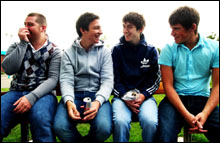 Leonard Cohen once said that living in England was like living inside a cabbage, a simile I can improve only by adding: an electrified cabbage. The UK’s enfolded and vegetal smallness has in recent decades and for a number of reasons become supercharged. Brits are the most monitored people on Earth: there are four million CCTV cameras distributed around the country, and the average Londoner gets photographed 300 times a day. Information throbs and wavers over the land in a hallucinatory pall, like the aura of a distant airport. The British press is overheated, excitable, always drumming politicians out of office or mounting campaigns to burn down pedophiles’ houses.
Leonard Cohen once said that living in England was like living inside a cabbage, a simile I can improve only by adding: an electrified cabbage. The UK’s enfolded and vegetal smallness has in recent decades and for a number of reasons become supercharged. Brits are the most monitored people on Earth: there are four million CCTV cameras distributed around the country, and the average Londoner gets photographed 300 times a day. Information throbs and wavers over the land in a hallucinatory pall, like the aura of a distant airport. The British press is overheated, excitable, always drumming politicians out of office or mounting campaigns to burn down pedophiles’ houses.
Then there’s the music press, afflicted since “the heady days of punk rock” (see right) with a metabolic craving for newness, a sugar lust for the next hot thing, what the writer Joe Carducci calls “novelty neurosis.” It is often said (by me, at least) that Nirvana could never have happened in Britain; Cobain and company could never have festered to maturity in the backwoods, gathering power and identity, learning to play and write and so on, because they would have been sprayed all over the cover of NME after their second rehearsal.

All this is by way of introducing the idea that hype in Britain works differently, on hotter and tighter circuits. Compared to the US, with its sluggish entertainment monoliths and regional markets adrift in continental vastness, it’s Beatlemania every day over there. Which brings us to Arctic Monkeys (who come to the Paradise March 23). Let’s go straight to the press kit helpfully included with my copy of the new CD Whatever People Say I Am, That’s What I’m Not. “For the inhabitants of the British Isles,” it begins, in oddly Gibbon-esque style, “the second half of 2005 belonged to one band and one band only.” Now that’s more like it — “one band and one band only”! Hurrah! To continue: “A group of four friends, barely out of high school in their small industrial satellite town in the North of England, burst into the national consciousness in a way not seen since the heady days of punk rock.” Hurrah again!
Yes, despite the classic indie-runt lineage suggested by their name (cf., Close Lobsters, Soup Dragons), Arctic Monkeys appear to have swallowed the United Kingdom whole. Last year their debut single, “I Bet That You Look Good on the Dancefloor,” went straight to #1. So did the follow-up, “When the Sun Goes Down.” This year Whatever People Say I Am . . . sold 363,735 copies in its week of release, that making it the UK’s fastest-selling debut album ever. And on top of this comes what we in the business refer to as “critical acclaim,” thunderingly good reviews, NME placing it #5 (four places above Revolver) in its Top Ten British Albums of All Time — thumbs-ups and high scores all round.
So how about this Whatever People Say I Am . . . ? Is it a masterpiece or a my-ass-terpiece? As my shrink used to say, “I think what we’re looking for here is a balance . . . ” These kids may not quite be the fifth-best British band of all time, but neither are they some freak of small-nation hysteria. What they are is most surprisingly good. Despite being insolently youthful (no one is over 20), and despite having “blown up” in the most egregious fashion before they’d done a single tour, Arctic Monkeys sound as dense and fully conceived as a band with four times their experience. To begin with, they can play — always refreshing in an English band. The guitars have bite, the rhythm section is nice and sinewy, and Alex Turner’s vocal delivery exactly summons what I imagine to be the young man’s gait: wired but loose-limbed, a mesh of carelessly distributed energies. He has the voice of someone shouting at you across a road. The tension in the sound comes from the application of various standardized post-punk strictures — dry drum patterns and brittle, sardonic single-note guitar lines — to an explosive rowdiness, a gang-like outburst that generally arrives with the chords and the chorus. Imagine Sham 69 working their way through the Haircut 100 songbook.
Turner’s lyrics are superb: bleakly witty, full of crappy late nights, tawdry hook-ups, drunken stand-offs in town centers, and young people leering and circling under disco lights. Deprived of the opportunity to live heroically — “Oh there ain’t no love, no Montagues or Capulets/Just bangin’ tunes and DJ sets . . . ” (“Bet That You Look Good on the Dancefloor”) — his characters crouch vengefully into the minor modes, into seen-it-all sarcasm and tingling aggression. Large amounts of booze can confer a brief grandeur on the situation, but not to the less-than-plastered observer: “These two lads squared up proper shouting/’Bout who was next in the queue/ The kind of thing that would seem so silly/ But not when they’ve both had a few . . . ” (“Red Light Indicates Doors Are Secure”).